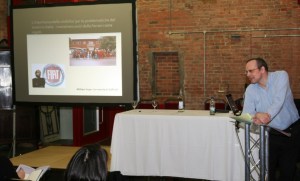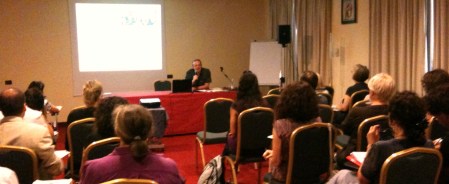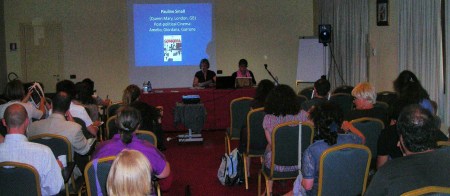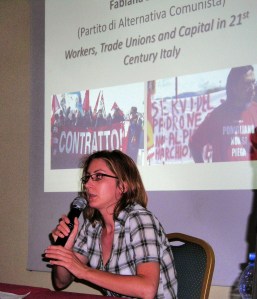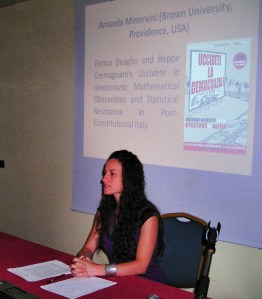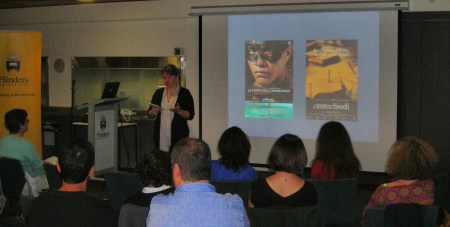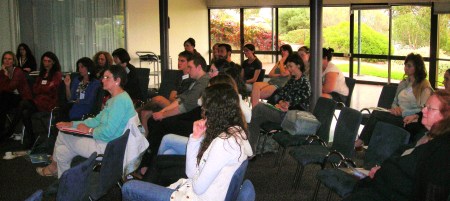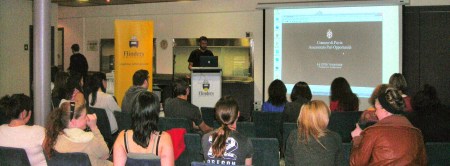The following programme can be considered to be definitive. The workshop will take place at the Hotel Impero, Cremona, on July 9th, 2011. Presentations will be in Italian and last 10 minutes; they will outline work in progress and pose questions for further discussion.
Although the workshop programme is full, with no further space for new speakers, places are still available to attend the workshop in an observational capacity. There will, however, be a formal guest list for the event and places are unlikely to be available on the day of the workshop. If you wish to attend the Cremona event as an observer, please contact William Hope (W.Hope@salford.ac.uk) and your name will be added to the guest list.

10.00-10.40: Registration
10.40-10.50: Introduction
William Hope (The University of Salford, GB. Co-ordinator of the project A New Italian Political Cinema?): Political Cinema: Screening the Effects of Capitalism
10.50-12.00: THE STATE, INSTITUTIONAL OPPRESSION AND COUNTER-REACTION
Amanda Minervini (Brown University, Providence, USA; activist in the Popolo Viola movement): Enrico Deaglio and Beppe Cremagnani’s Uccidete la democrazia: Mathematical Obscenities and Statistical Resistance in Post-Constitutional Italy
Clodagh Brook (The University of Birmingham, GB): Impegno, Protest, and the Catholic Church in Italy
Federico Giordano (The University of Udine): From the ‘Shroud’ to the ‘Caimano’. The Somatic Polymorphism of Silvio Berlusconi in Italian Cinema.
Mauro Sassi (McGill University, Montreal, Canada): Francesca Comencini’s Carlo Giuliani, ragazzo – A Counterhegemonic Documentary
12.00-12.30: Refreshments
12.30-1.30: REPRESENTATIONS OF ITALY’S SOCIO-POLITICAL PAST
Introduction: Luciana d’Arcangeli (Flinders University, Adelaide): Why does Italian cinema still need to turn to the past?
Pauline Small (Queen Mary, London GB): Post-political Cinema: Amelio, Giordana, Garrone
Flavia Brizio-Skov (University of Tennessee): A New Italian Political Cinema: Is There One? Daniele Luchetti’s Mio fratello è figlio unico
Ilaria Serra (Florida Atlantic University, USA): Cinema and polis in the films of Dennis Dellai
1.30-2.30: Lunch
2.30-4.00: MIGRATION AND MARGINALIZATION ON SCREEN
Patrizia Cammarata (Partito di Alternativa Comunista): The Migrant Experience in Contemporary Italy
Michela Ardizzoni (University of Colorado, Boulder, USA): New Narratives of the Other: Arabs and Muslims in Italian Cinema
Sabine Schrader (University of Innsbruck, Austria): Migration and Nostalgia in Giorgio Diritti’s Il vento fa il suo giro
Yasmina Khamal (Université catholique de Louvain, Belgium): Alex Infascelli’s Almost Blue : The noir metropolis, marginal identities and socially committed cinema
Sally Hill (Victoria University of Wellington, New Zealand): Representing Disability in 21st Century Italian Cinema
4.00-4.30: Refreshments
4.30-6.10: FILMIC REPRESENTATIONS OF LABOUR RELATIONS AND THE WORKPLACE
Fabiana Stefanoni (Partito di Alternativa Comunista): Workers, Trade Unions and Capital in 21st Century Italy
Paolo Chirumbolo (Louisiana State University, USA): Ascanio Celestini’s Parole sante – the Call Centre Workers of Atesia
Maria Elena D’Amelio (SUNY Stony Brook, USA): The comedy of ‘precarious’ lifestyles in Paolo Virzì’s Tutta la vita davanti
Marco Paoli (The University of Liverpool, UK): Paolo Virzì’s Baci e abbracci: Class Conflict and Illusionary Happiness
Flavia Laviosa (Wellesley College, USA) “‘Lasciate ogni speranza, voi ch’entrate’ in ThyssenKrupp”: Pietro Balla and Monica Repetto’s ThyssenKrupp Blues
Andrea Righi (University of Puerto Rico, MAYAGUEZ): Filming Capitalist Accumulation in Italy. In fabbrica (2007) and I Like to Work (Mobbing) (2004) by Francesca Comencini
6.10-6.20: Closing Remarks
7.00: Aperitivo






